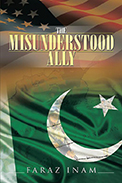
 |
Lt. Col. Dhil Jahangiri, a commanding officer in the Pakistan Army, is increasingly troubled by a war he believes is untenable. Sp. Agt. Samantha Albright, a CIA operative and drone specialist, must reconcile decisions that sometimes result in collateral damage. Mullah Baaz Jan, a militant commander in the Army of Muslim soldiers (LaM,) watches as his beloved leader is killed when a CIA drone hits a village mosque. Entangled in the "war on terror," each of these characters approaches the war with different perspectives and objectives. The ramifications of the mosque bombing by the CIA set these three on a collision course with horrifying results that, though unintended, should not have been unexpected.
Through characters representing the United States, Pakistan, and the militant groups forged after Russia’s 1980s occupation of Afghanistan, Inam presents a compelling story of war. He tackles each character’s viewpoint without judgment. The impetus behind the militant desire to create a conservative Islamic state is rendered with insight and compassion. He effectively explains the Pakistanis’ resentment at being indebted to a country for its gifts of humanitarian aid even as that country poses difficulties for Pakistan’s people in its pursuit of militant groups.
Undoubtedly, Inam, through his associations and research on the subject, has personal insight into the situation in Pakistan, yet he also possesses a consonant grasp on the American point-of-view. His ability to invoke empathy for each character is a testament to his comprehension of the human psyche. Anyone wishing to gain insight into the complex relationship between Pakistan and the United States will find it here. Inam’s story will surprise, anger, and sadden the reader, but it will also enlighten those who embrace his skill to reveal vastly different perspectives with honesty and sensitivity.
RECOMMENDED by the US Review